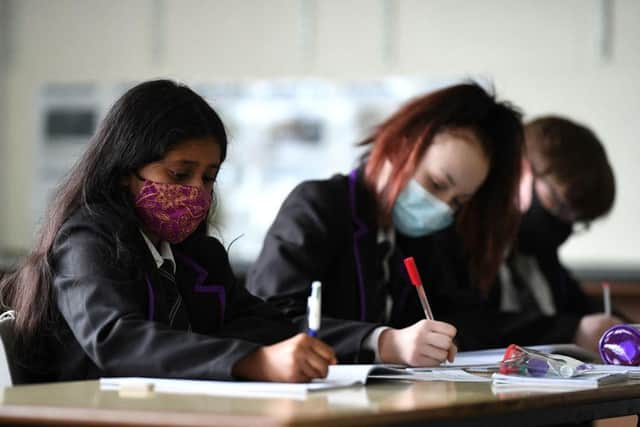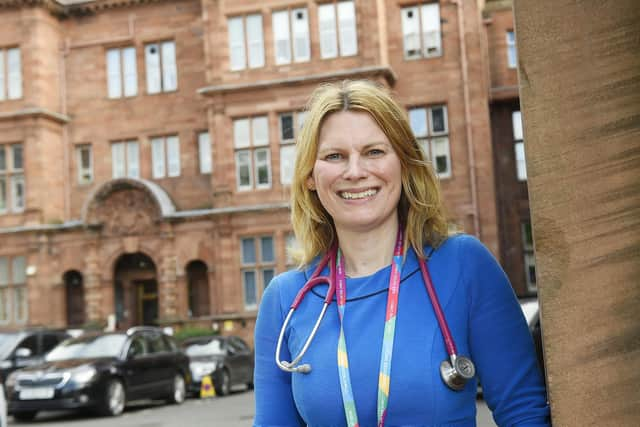Covid Scotland: Return to school may be ‘traumatic’ for some children
The warning comes amid growing concerns over child mental health during the Covid pandemic, with increases in cases of depression, anxiety, eating disorders and self-harm.
Many children are set to return to school in person this Wednesday or Thursday, with some having already restarted last week.
Advertisement
Hide AdAdvertisement
Hide AdThe Royal College of Paediatrics and Child Health (RCPCH) said while this will be a benefit to many children, some may be anxious after 18 months of disrupted schooling.


The pandemic has had a “profound effect” on children’s mental health, said the Royal College of Psychiatrists, some of whom have struggled to cope and see the return to school as yet another challenge.
And the NSPCC said it had seen children contact Childline over concerns about going back to school.
The new term is also expected to spark an increase in Covid cases, as well as a rise in the spread of non-Covid viruses, such as flu, paraflu, respiratory syncytial virus (RSV) and Rhinovirus, which causes the common cold.
Against a backdrop of health boards already under so much pressure that many have cancelled non-urgent care, healthcare staff are “dreading winter”, according to one infectious diseases expert.


The continued use of face coverings for older children in schools may help to reduce this spread, the RCPCH said.
The college also urged 16 and 17-year-olds to take up the Covid vaccine they have recently been offered, as this will “protect their ability to go to school and get on with their lives”.
Dr Mairi Stark, RCPCH Scotland officer and a paediatrician at Edinburgh’s Royal Hospital for Children and Young People, said she and colleagues were concerned about children returning to school, particularly in older age groups.
Advertisement
Hide AdAdvertisement
Hide Ad“These children have been off school quite a lot, and quite a lot of them are quite anxious, and going back to school is quite a big trauma for a lot of children,” she said.
“Even if they like school and they've previously not had problems, the fact that they've been off for so long makes it quite tricky.”
The effect of this, Dr Stark said, may be more vulnerable children arriving at hospital in acute crisis, after a drug overdose or heavy drinking in a bid to “blot out” their anxiety.
In less vulnerable children, the anxiety often manifests in physical symptoms, with children complaining of fatigue, headaches or sore stomachs which prevent them going to school.
She is also expecting to see more cases of eating disorders throughout the year.
Normal coping mechanisms for these children have “disappeared”, Dr Stark said, with a huge number of clubs disbanded, and outdoor activities reduced during the pandemic.
“A lot of those kids will have spent a huge amount of time over the holidays just playing computer games,” she said, making them “anxious and withdrawn”.
Dr Helen Smith, chair of the CAMHS faculty at the Royal College of Psychiatrists, said depressive episodes, symptoms of anxiety, and eating disorders were “much more prevalent than before” in children.
Advertisement
Hide AdAdvertisement
Hide Ad“All the young people I see talk about their worries for the future, or uncertainty about their education – everything that happened last year is preying on their minds,” she said.
Children have been contacting Childline about returning to school, as well as about loneliness, isolation, classwork and exams, said Joanne Smith, policy and public affairs manager at NSPCC Scotland.
It is now crucial for schools across Scotland to support children’s mental and emotional wellbeing, and to be given the resources to do so, she said.
Dr Antonia Ho, a senior lecturer in infectious diseases at Glasgow University and consultant at the Queen Elizabeth University Hospital in Glasgow and University Hospital Monklands, is expecting to see an increase in Covid and non-Covid viruses after schools go back.
She has “real concerns” about how the NHS will cope with this, as wards are much busier than would usually be expected in the summer.
"The case load is much higher than we would normally see for this time of year,” she said.
“This can only continue at the same rate, and if we add a lot more Covid or flu on top of that … the NHS is currently really struggling to cope as it is.
“The staff are really exhausted, we've dealt with three long waves of Covid infection, ever changing parameters to work in ... I think staff morale is really low and I think everyone is dreading winter."
Winter in the NHS is always hard, Dr Ho said.
Advertisement
Hide AdAdvertisement
Hide Ad“This winter, if flu comes back, on top of all the backlog of non-Covid work that's impacted on the whole population, I think there is concern that the NHS will really struggle,” she said.
“NHS staff have been struggling for the last 18 months and working above and beyond. We will continue to do it, because it's our job. But they talk about resilience ... it can only go for so long.”
The Scottish Government has said it considers mental health a priority and is committed to ensuring everyone can access support.
Ahead of the return to school, a spokesperson said the safety of pupils and staff had been a “top priority”.
“We know that when schools return it can result in greater mixing between adults in wider society – so it’s vitally important that everyone continues to exercise caution and follow the guidance that applies to them,” the spokesperson said.
“We recognise the additional pressure NHS staff are facing as they work tirelessly to respond to the pandemic whilst continuing to provide vital treatment and safe patient care – and we are in daily contact with boards facing the greatest challenges and are monitoring the situation closely.”
A message from the Editor:
Thank you for reading this article. We're more reliant on your support than ever as the shift in consumer habits brought about by coronavirus impacts our advertisers.
If you haven't already, please consider supporting our trusted, fact-checked journalism by taking out a digital subscription.
Comments
Want to join the conversation? Please or to comment on this article.
